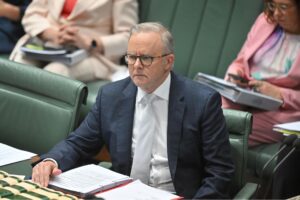Neoliberalism can’t and won’t fix our climate crisis or save our endangered species from extinction.
Market-based policies have failed spectacularly when it comes to aged care, disability care and saving the Murray River. But despite the catalogue of catastrophe, earlier this month Tanya Plibersek said: “Ultimately, I would like to see the market truly valuing nature, so that protecting forests is more valuable than destroying them.”
The environment minister went on to suggest that by establishing a biodiversity market Australia could one day “ house its own Green Wall Street: a trusted global financial hub, where the world comes to invest in environmental protection and restoration”.
Markets do not value people, platypuses, or ecosystems. The only thing markets “value” is expected future profits that a company or an activity might generate. The share price of a company reflects investor expectations of future profits and dividends. It would be great if the corporations “investing” in biodiversity were doing it purely to save the koalas or bogong moths, but the fact is that no one invests out of the goodness of their heart without expecting some sort of return.
While Plibersek has been vague on the exact terminology of the units that would be traded under the proposed scheme, the most likely customers for biodiversity certificates or credits would be landowners who want to offset the destruction of some of their remaining wildlife habitat to build new developments or new mines. The “market price” for such destruction won’t be determined by the value of a koala, but by the potential profits of destroying a similar sized piece of habitat elsewhere.
Australia doesn’t need elaborate new “market mechanisms” to save our precious environment. We just need to stop approving new housing developments where koalas still like to live, or new mines where platypuses live. And we need to stop the approval of the 116 coal and gas projects currently on the books in Australia which will inevitably cause the climate change that most threatens all of our unique species.
The problem with such policies is they work, which is why those determined to destroy what’s left of our habitat prefer to avoid some regulations in favour of complicated trading schemes that just don’t work.
This is not a new critique. The New South Wales auditor general recently investigated the state’s biodiversity scheme and found the NSW Department of Planning and Environment “has not effectively designed core elements of the Scheme”.
The auditor general’s report, described as “damning”, found that “key concerns around the Scheme’s transparency, sustainability and integrity are yet to be fully resolved” and “that biodiversity gains made through the Scheme will not be sufficient to offset losses resulting from development”.
Despite the failures of the NSW biodiversity offsets scheme, the federal government is racing down the same flawed path.
As the state of the environment report makes clear, habitat loss is one of the major risks to what’s left of Australia’s biodiversity. Even if it were possible to measure all the biodiversity on each hectare of land, and develop an exchange rate for koalas, platypus, and possums, and then ensure there was no fraud or conflicts of interests, the idea that we will let mining companies and property developers destroy some of what’s left of our precious habitat as long as they buy an “offset” from someone else is bizarre.
If Australia is serious about protecting our endangered species, we need to protect what’s left of their habitat, not ask the market to set a price for destroying it.
Unfortunately, this same obsession with offsetting has become central to climate policy as well. Rather than insist big polluters reduce their emissions, and rather than prevent new gas and coal mines being built, the Albanese government’s proposed “safeguard mechanism” will likely place no binding obligation on big polluters to actually reduce their emissions, simply allowing them to purchase carbon offsets instead.
At the heart of the safeguard mechanism will be yet another complicated trading scheme, where both existing and new fossil fuel projects will be allowed to increase their emissions while buying dodgy offsets from someone who has promised not to chop down a tree they were unlikely ever to chop down. Even though the investigation into integrity concerns with such dodgy credits won’t be completed till December, the climate change minister, Chris Bowen, is planning to have his new carbon trading legislation drafted by November.
Scrapping $11bn per year’s worth of fossil fuel subsidises and banning new coal and gas projects would be great for the budget and the climate, and it would free up a lot of money to save animals.
But instead of doing what’s cheap and easy, our government has chosen to do something complex and risky. It’s easy to see why the property developers and mining industry are willing to take the risk, but it’s hard to see what’s in it for the koalas.
Dr Richard Denniss is executive director of the independent thinktank the Australia Institute Twitter: https://twitter.com/RDNS_TAI
Between the Lines Newsletter
The biggest stories and the best analysis from the team at the Australia Institute, delivered to your inbox every fortnight.
You might also like
Big private health insurers make huge profits… but they want you to pay more
Despite huge profit margins, the big three private health insurers keep higher and higher premiums.
What conservatives do better | Between the Lines
The Wrap with Amy Remeikis If there is one thing you can bank on, it is that conservative governments know how to use power. They never shy away from it. If a conservative government wants to change something, it will, and it won’t worry about who it is annoying, or the pushback, or whether or
The Australia Institute launches new documentary – Save Tuvalu, Save The World
The Australia Institute has officially launched a new documentary taking viewers to front line of the fight against climate change.

